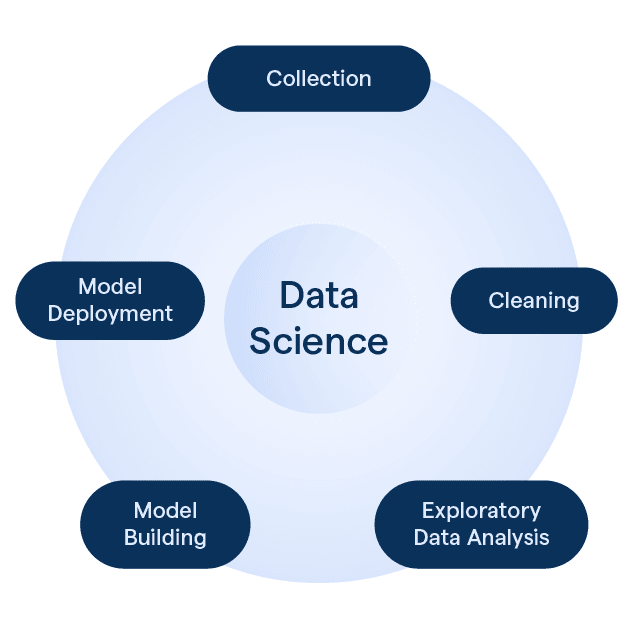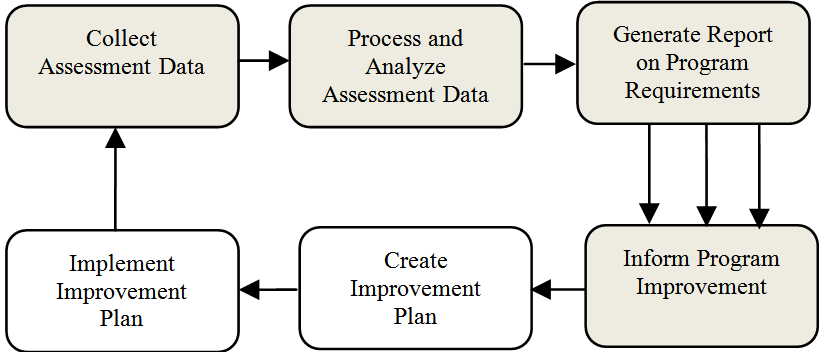
- A Data Science Course: What Is It?
- Key Topics in Data Science
- Important Data Science Subjects in Depth
- Syllabus for Data Science Courses: Organized Summary
- Evaluation of Programs in Data Science
- What Are the Program Requirements for Data Science?
- Conclusion
Data science is an interdisciplinary field that combines statistics, programming, and domain expertise to extract actionable insights from data. This course introduces students to key data science concepts, tools, and techniques, empowering them to apply these methods in real-world scenarios. Throughout this course, students will learn how to work with large datasets, clean and preprocess data, build predictive models, and communicate findings using data visualization tools. The course is suitable for beginners and those looking to expand their data science knowledge, as it includes theoretical lessons and practical hands-on experience. Key topics covered in the course include Python programming, data exploration and cleaning, machine learning algorithms, data visualization techniques, big data technologies, and deep learning. By the end of the course, students will have a solid understanding of data science principles and the ability to implement solutions using industry-standard tools and methods.
A Data Science Course: What Is It?
A Data Science course is designed to give students a deep understanding of analyzing large volumes of data and extracting meaningful insights from them. It combines various fields, such as statistics, machine learning, data engineering, and computer science, to help individuals process, analyze, and visualize data in ways that can guide decision-making across different industries. In the digital age, the demand for data scientists has surged due to the exponential growth of data and the necessity to make informed decisions from that data. A typical Data Science course offers a mix of theoretical knowledge and practical hands-on experience with tools, programming languages, and techniques used in the field. These courses generally focus on developing problem-solving skills, critical thinking, and the ability to handle large datasets, which are essential for a career in data science. Students may learn to manipulate data, develop algorithms, and communicate insights through clear and compelling data visualizations.
Unlock your potential in Data Science with this Data Science Certification Training .
Key Topics in Data Science
A comprehensive Data Science course covers a wide range of topics that provide students with the skills they need to navigate the complexities of working with data. Some of the key issues include:
- Data Collection and Cleaning: Data cleaning is one of the most critical tasks in the data science pipeline. Before data can be analyzed, it must be cleaned and preprocessed to remove inconsistencies, handle missing values, and ensure accuracy. Topics in this area include working with different data types, transforming data into a usable format, and eliminating duplicates or irrelevant data.
- Exploratory Data Analysis (EDA): EDA analyzes datasets to summarize their main characteristics, often visualizing them using graphs and plots. This is a crucial step in understanding the data and forming hypotheses. Techniques learned in this module include identifying trends, relationships, and outliers in data.
- Machine Learning: Machine learning algorithms are used to make predictions or decisions based on data. Students will learn supervised and unsupervised learning, including regression models, classification algorithms (like decision trees, random forests, and support vector machines), and clustering methods such as k-means.
- Data Visualization: Presenting data visually is essential for communicating insights effectively. Students will be taught how to use tools like Matplotlib, Seaborn, and Tableau to create compelling charts, graphs, and interactive dashboards that allow stakeholders to understand complex information at a glance.
- Big Data and Cloud Computing: With the rise of big data, data science courses often cover topics related to handling large datasets. This section explores technologies like Hadoop, Apache Spark and cloud computing platforms such as AWS and Google Cloud. Students learn how to work with distributed systems and build scalable data pipelines.
- Deep Learning: Deep learning is a subset of machine learning that uses artificial neural networks to model complex patterns in data. Deep learning is beneficial in areas like computer vision, natural language processing, and time-series forecasting. This topic covers the fundamentals of neural networks, convolutional neural networks (CNNs), and recurrent neural networks (RNNs).
- Statistics: Data science heavily relies on statistics to make inferences and conclusions from data. Students learn probability theory, hypothesis testing, confidence intervals, and other statistical methods to evaluate data and determine the validity of their findings.
- Data Ethics: Understanding the ethical implications of data science is crucial. This includes ensuring privacy, fairness, data collection, analysis, and reporting transparency. Moral issues such as bias in data and models and data privacy laws like GDPR are discussed.

Important Data Science Subjects in Depth
To master data science, students must delve deeply into several subjects that form the discipline’s core. These include:
- Python Programming: Python is the most commonly used programming language in data science due to its simplicity and powerful libraries (Pandas, NumPy, Matplotlib, Scikit-learn). Python is used for data manipulation, analysis, machine learning, and visualization, making it an essential language for anyone pursuing a career in data science.
- Machine Learning Algorithms: Many data science courses are dedicated to teaching students machine learning algorithms. Students will learn how to apply algorithms to real-world data and understand the mathematics and statistics behind these methods. This knowledge is crucial for building predictive models and improving their performance.
- Big Data Processing: As data volumes grow, students will learn how to handle large datasets using distributed systems like Hadoop and Spark. They will process, store, and analyze data across multiple machines in a way that allows them to scale their analysis and predictions.
- Data Wrangling: Data wrangling involves cleaning and transforming raw data into a structured format that can be used for analysis. Students will learn to use data-wrangling tools and techniques to manipulate data efficiently, handle missing data, and join or merge different datasets.
- Deep Learning and Neural Networks: Deep learning has revolutionized data science, especially for tasks related to image and speech recognition, natural language processing, and other complex problems. Students will be introduced to neural network architectures, training techniques, and frameworks like TensorFlow and PyTorch.
- Data Visualization: Effective data visualization is a critical skill in data science. Courses emphasize creating explicit, impactful visual representations of data to make insights accessible to technical and non-technical audiences. This involves learning various plotting techniques and interactive visualization tools.
Syllabus for Data Science Courses: Organized Summary
A typical Data Science course syllabus might follow this structure:
Introduction to Data Science- Overview of Data Science and its applications in various fields.
- Introduction to Python and key libraries like Pandas and NumPy. Data Collection and Preprocessing
- Techniques for gathering, cleaning, and transforming data.
- Handling missing data, duplicates, and outliers. Exploratory Data Analysis (EDA)
- Descriptive statistics and summary measures.
- Visualizing data using Matplotlib and Seaborn. Introduction to Machine Learning
- Overview of supervised and unsupervised learning.
- Introduction to algorithms like linear regression and decision trees. Advanced Machine Learning Techniques
- Exploring complex algorithms such as random forests, SVM, and ensemble methods.
- Hyperparameter tuning and cross-validation. Deep Learning and Neural Networks
- Introduction to neural networks and deep learning frameworks.
- Training models for image classification and time-series forecasting. Big Data Technologies
- Working with distributed data processing tools like Hadoop and Spark.
- Using cloud computing platforms for data storage and analysis. Data Visualization and Storytelling
- Creating clear visualizations and dashboards.
- Communicating data insights effectively to stakeholders. Model Deployment and Ethics
- Deploying models into production.
- Understanding data privacy, bias, and ethical concerns in data science. Capstone Project and Evaluation
- A final project that allows students to apply their knowledge to a real-world problem.
- Project presentation and evaluation.
Evaluation of Programs in Data Science
When evaluating Data Science programs, it’s important to consider several key factors that contribute to a well-rounded and effective learning experience. Curriculum quality is crucial; look for programs that offer a comprehensive range of topics such as programming, statistics, machine learning, and data visualization, along with hands-on projects that enable students to apply what they’ve learned in real-world scenarios. Instructor expertise also plays a significant role; ideally, instructors should be seasoned professionals or researchers who bring valuable industry insights and practical knowledge to the classroom. In addition, a good program should offer ample hands-on opportunities, including working with real datasets and solving practical data science problems, as well as chances for internships or industry collaborations. Lastly, ensure that the program provides access to industry-standard tools and software, such as Python, TensorFlow, and Hadoop, while also familiarizing students with cloud computing and big data platforms to prepare them for real-world challenges in the data science field.

What Are the Program Requirements for Data Science?
The requirements for a Data Science program typically include:
- Prior Knowledge in Mathematics and Statistics: A strong understanding of introductory algebra, probability, and statistics is essential. Courses in linear algebra and calculus are also beneficial.
- Programming Skills: Familiarity with programming languages like Python or R is essential. Some programs may require students to have a basic understanding of these languages before enrollment.
- Experience with Data: Essential experience handling datasets or working with tools like Excel or SQL is often helpful but not always necessary.
- Degree Requirements: Most Data Science programs require a background in computer science, engineering, statistics, or related fields. However, some boot camps or online courses accept students from diverse backgrounds.
Conclusion
Data Science is a dynamic and evolving field that requires a blend of technical skills, problem-solving abilities, and domain knowledge. An intensive Data Science course will equip students to clean and process data, apply machine learning models, visualize results, and communicate findings effectively. By the end of such a program, students should be well-prepared for a wide range of careers in data science, including roles like data analyst, data engineer, and machine learning engineer. The growth and increasing need for data-driven decision-making ensure that Data Science remains one of the most promising and in-demand fields in technology today.





